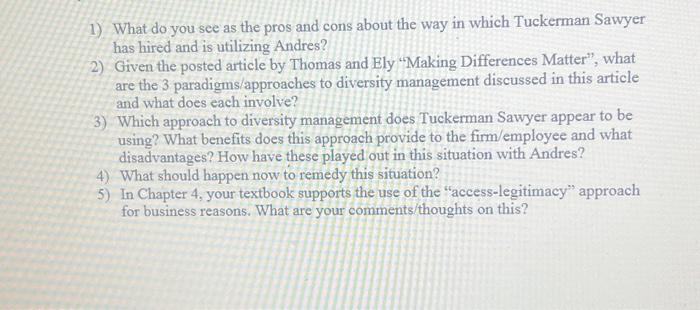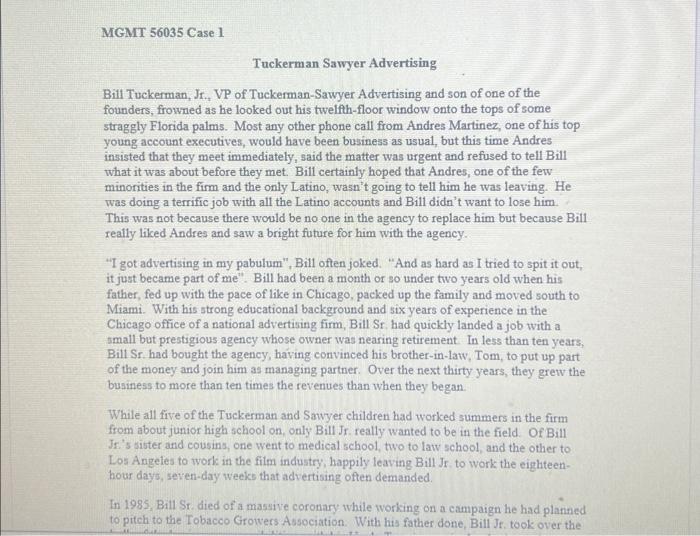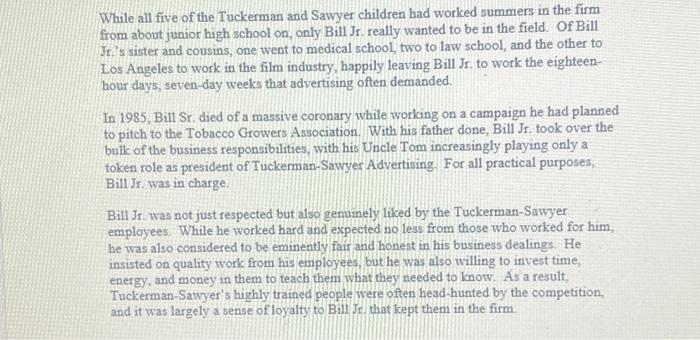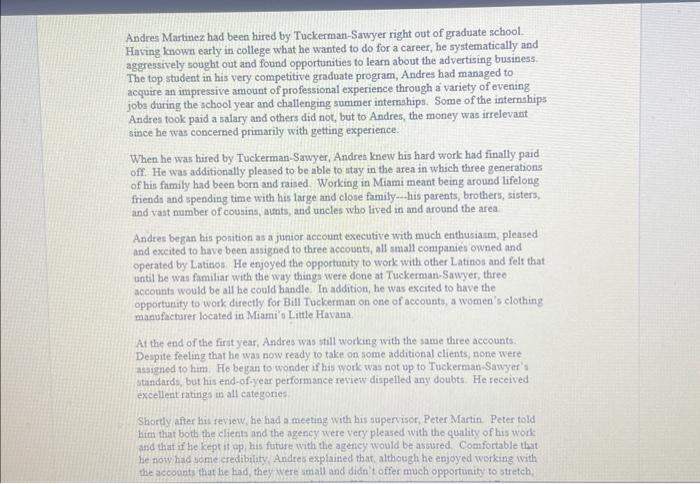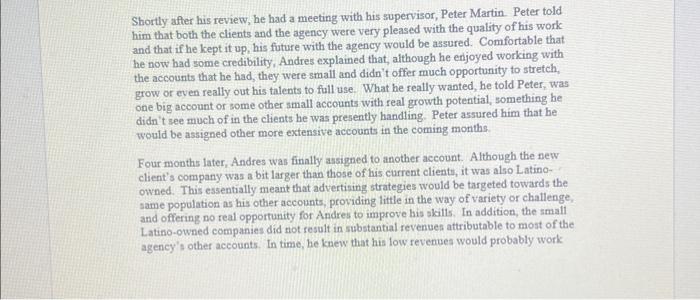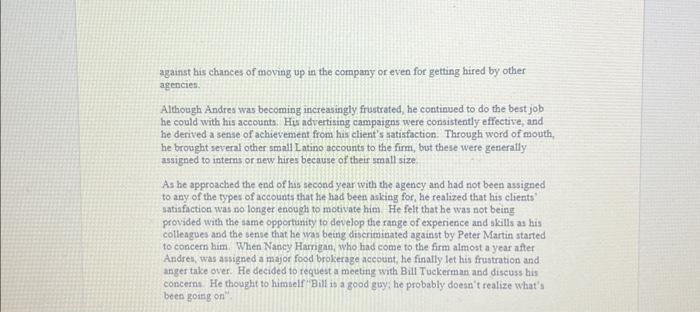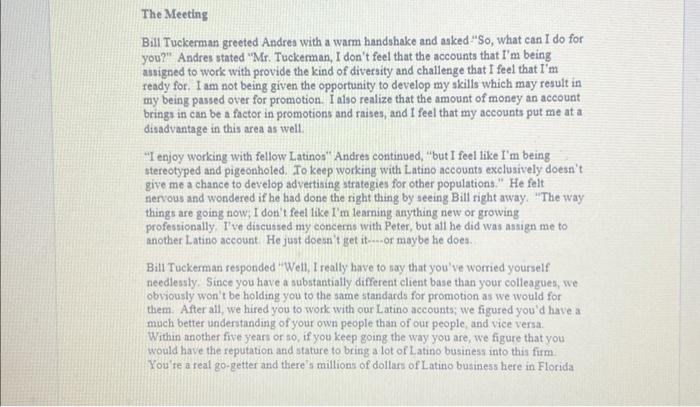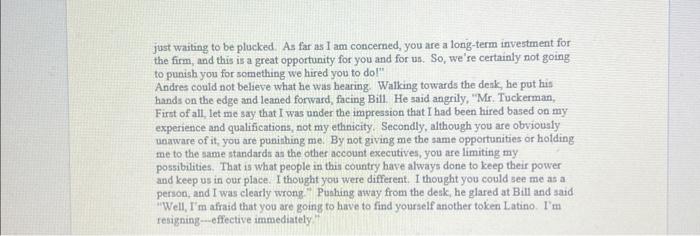1) What do you see as the pros and cons about the way in which Tuckerman Sawyer has hired and is utilizing Andres? 2) Given the posted article by Thomas and Ely "Making Differences Matter", what are the 3 paradigms/approaches to diversity management discussed in this article and what does each involve? 3) Which approach to diversity management does Tuckerman Sawyer appear to be using? What benefits does this approach provide to the firm/employee and what disadvantages? How have these played out in this situation with Andres? 4) What should happen now to remedy this situation? 5) In Chapter 4, your textbook supports the use of the "access-legitimacy" approach for business reasons. What are your comments/thoughts on this?
1) What do you see as the pros and cons about the way in which Tuckerman Sawyer has hired and is utilizing Andres? 2) Given the posted article by Thomas and Ely "Making Differences Matter", what are the 3 paradigms/approaches to diversity management discussed in this article and what does each involve? 3) Which approach to diversity management does Tuckerman Sawyer appear to be using? What benefits does this approach provide to the firm/employee and what disadvantages? How have these played out in this situation with Andres? 4) What should happen now to remedy this situation? 5) In Chapter 4, your textbook supports the use of the "access-legitimacy" approach for business reasons. What are your comments/thoughts on this? Tuckerman Sawyer Advertising Bill Tuckerman, Jr., VP of Tuckerman-Sawyer Advertising and son of one of the founders, frowned as he looked out his twelfth-floor window onto the tops of some straggly Florida palms. Most any other phone call from Andres Martinez, one of his top young account executives, would have been business as usual, but this time Andres insisted that they meet immediately, said the matter was urgent and refused to tell Bill what it was about before they met. Bill certainly hoped that Andres, one of the few minorities in the firm and the only Latino, wasn't going to tell him he was leaving. He was doing a terrific job with all the Latino accounts and Bill didn't want to lose him. This was not because there would be no one in the agency to replace him but because Bill really liked Andres and saw a bright future for him with the agency. "I got advertising in my pabulum", Bill often joked. "And as hard as I tried to spit it out, it just became part of me". Bill had been a month or so under two years old when his father, fed up with the pace of like in Chicago, packed up the family and moved south to Miami. With his strong educational background and six years of experience in the Chicago office of a national advertising firm, Bill Sr. lad quickly landed a job with a small but prestigious agency whose owner was nearing retirement. In less than ten years, Bill Sr. had bought the agency, having convinced his brother-in-law, Tom, to put up part of the money and join him as managing partner. Over the next thirty years, they grew the business to more than ten times the revenues than when they began. While all five of the Tuckerman and Sawyer children had worked summers in the firm from about junior high school on, only Bill Jr. really wanted to be in the field. Of Bill In's sitter and cousins, one went to medieal schoot, two to taw school, and the other to Los Angeles to work in the film industry, happily leaving Bill Js to work the eighteenhour days, seven-day weeks that advertising often demanded. In 1995, Bill St, fited of tr mastive coronary white tvorking on a campaign he had planned to pitch to the Tobacco Growers Association. With his father done, Bill Jf. took over the Andres Martinez had been hired by Tuckerman-Sawyer right out of graduate school. Having known early in college what he wanted to do for a career, he systematically and aggreasively sought out and found opportunities to learn about the advertising business. The top student in his very competitive graduate program, Andres had managed to acquire an impressive amount of professional experience through a variety of evening jobs during the school year and challenging summer internhips. Some of the internthips Andres took paid a salary and others did not, but to Andres, the money was irrelevant since be was concerned primarily with getting experience. When he was fired by Tuckerman-Srwyer, Andren knew his hard work had finally paid off. He was additionally pleased to be able to atay in the area in which three generations of his family had been born and raised. Working in Miami meant being around lifelong friends and spending time with his large and close family.-.his parents, brothers, sisters, and vatt number of cousins, aunts, and uncles who lived in and around the area. Andres began his ponition as a junior account executive with much enthusiam, pleased and excited to have been assigned to three accounts, all small companies owned and operated by Latinos. He enjoyed the opportunity to work with other Latinos and felt that until be was frmiliar with the way things were done at Tuckerman-Sawyer, three accounts would be all he could handle. In addition, he was excited to have the opportusity to work directly for Bill Tuckerman on one of accounts, a women's clothing manufacharer located in Miami's Little Havana At the end of the firnt year, Andres was itill working with the same three accounts. Despite feeling that he was now ready to take on some additional clients, none were assigned to him. Ho began to wonder if his work was not up to Tuckerman-Sawyef's standards, but his end-of-year performance review dispelled any doubts. He received excellent ratings it all categories Shortly anter hin feview, he had a meeting with his supervisor, Peter Martin. Peter told hin that both the elients and the agency were very pleased with the quality of his work: he noty fad some credibility, Andres explained that, although he epjoyed working ivith Shortly after his review, he had a meeting with his supervisor, Peter Martin. Peter told him that both the clients and the agency were very pleased with the quality of his work and that if he kept it up, his future with the agency would be assured. Comfortable that he now had some credibility, Andres explained that, although he erjoyed working with the accounts that he had, they were small and didn't offer much opportunity to stretch, grow or even really out his talents to full use. What he really wanted, he told Peter, was one big acoount or some other small accounts with real growth potential, something he didn't see much of in the clients he was presently handling. Peter assured him that he would be assigned other more extensive accounts in the coming months. Four months later, Andres was finally assigned to another account. Although the new client's company was a bit larger than those of his current clients, it was also Latinoowned. This essentially meant that advertiting strategies would be targeted towards the same population as his other accounts, providing little in the way of variety or challenge, and offering no real opportunity for Andres to improve his akills. In addition, the small Latino-owned companies did not result in substantial revenues attributable to most of the agency's other accounts. In time, he knew that his low revenues would probably work against his chances of moving up in the cornpany or even for getting hired by other agencies: Although Andres was becoming increasingly frustrated, he continued to do the best job he could with his accounts. His advertising campaigns were consistently effective, and he derived a sense of achievement from his client's satisfaction. Through word of mouth, he brought several other small Latino accounts to the firm, but these were generally assigned to interns or new hires because of their small size. As he approached the end of his second year with the agency and had not been assigned to any of the types of accounts that he had been asking for, he realized that his clieats' satiafiction was no longer enough to motivate him. He felt that he was not being provided with the isme opportunity to develop the range of experience and akills as his colleagues and the sense that he was being discriminated against by Peter Martin started to concern him. When Nancy Harngan, who had come to the firm almost a year after Andres, was assigned a major food brokerage aceount, he finalfy let his frustration and anger take over. He decided to request a meeting with Bill Tuekerman and discuss his concerns. He thought to himself 'Bill is a good giay; he probably doesn't realize what's been going on Bill Tuckerman greeted Andres with a warm handshake and asked "So, what can I do for you?" Andres stated "Mr. Tuckerman, I don't feel that the accounts that I' m being ausigned to work with provide the kind of diversity and challenge that I feel that I'm ready for. I am not being given the opportunity to develop my skills which may result in my being passed over for promotion. I also realize that the amount of money an account brings in can be a factor in promotions and raises, and I feel that my accounts put me at a disadvantage in this area as well "I enjoy working with fellow Latinos" Andres continued, "but I feel like I'm being stereotyped and pigeonholed. To keep working with Latino accounts exclusively doetn't give me a chance to develop advertising strategies for other poputations." He feit nervous and wondered if he had done the right thing by seeing Bill right away. "The way things are going now, I don't feel like I'm learning anything new or growing. professionally, Ive discussed my concerns with Peter, but all he did was assign me to ninother Latino account. He just doesn't get it....or maybe he does. Bill Tuckerman responded "Well, I really have to ray that you've worried yourself needlessly. Since you have a substantially different client base than your colleagues, we obviousty won't be hording you to the same standards for promotion as we woutd for them. After all, we hired you to work with our Latino accounts; we figured you'd have a much better understanding of your own people than of our people, and vice versa. Within another five years or so, if you keep going the way you are, we figure that you would have the reputation and stature to bing a lot of Latino business into this firm You're a real go-getter and there's miltions of dollars of Latino business here in Florida just waiting to be plucked. As far as I am concerned, you are a long-term investment for the firm, and this is a great opportunity for you and for us. So, we're certainly not going to punish you for something we hired you to dol" Andres could not believe what he was hearing. Walking towards the denk, he put his hands on the edge and leaned forward, facing Bill. He said angrily, "Mr. Tuckerman, First of all, let me say that I was under the impression that I had been hired based on my experience and qualificalions, not my ethinicity. Secondty, atthough you are obviously unaware of it, you are punithing me. By not giving me the same opportunities or holding me to the same standards as the other account executives, you are limiting my possibilities. That is what people in thit country have always done to keep their power and keep us in our place. I thought you were different. I thought you could see me as a person, and I was clearly wrong." Puhing away from the desk, he glared at Bill and said "Well, I'm afraid that you are going to have to find yourself another token Latino. I'm resigning--effective immediately
